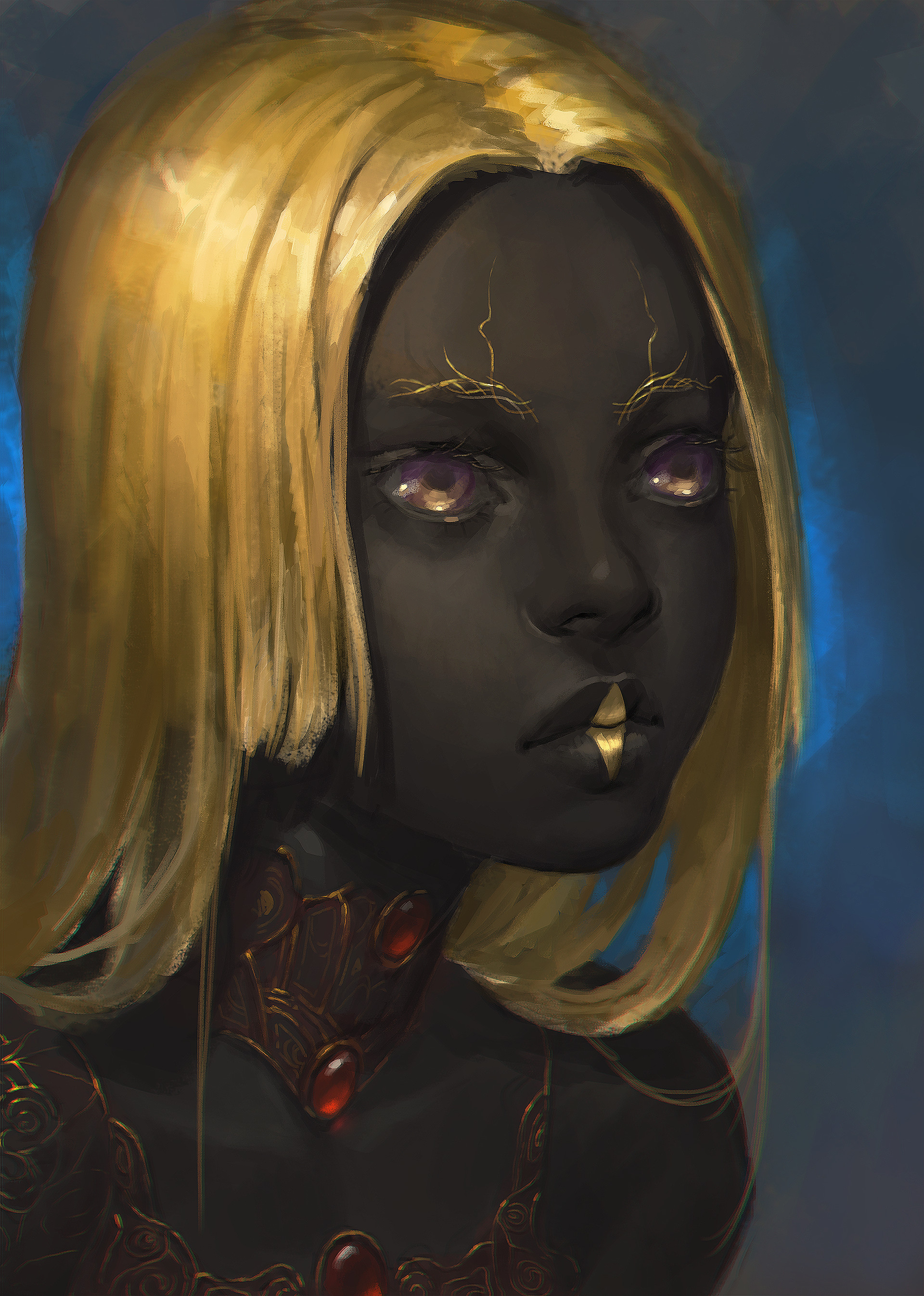
Fìrinn’s mantle traced the various etchings and carvings of the Tairseach, gazing intently at its own reflection within, and a flicker of light across its almost-face gave the distinct impression of a smile. Completion from without and within; the harmony of Truth through Reflection. Such musings were not uncommon for a god of understanding and context, but few things were as pleasing to Fìrinn as endless introspection before the great Anchor and the only reflection so powerful as to encompass the divine that currently existed. There was a sense of calmness and completion that filled Fìrinn while it gazed into the depths of its mirror-self that none of the chaos of reality could offer, and while it was tempting to simply lose itself in that sense of serenity there was still much of reality to align with deepest Truth.
Chiefly among the God of Truth’s priorities was reaching an accord with its divine brethren whose domains it had, or eventually would, trespass upon. It would need to make accords with the Gods of the Land and Sea, whose space it had borrowed for this most holy Anchor. It would need to make an accord with the Lord of the Afterlife, for those souls whose reflections would be unmoored from reality. It would need to make sure it had the blessings of Sun and Moon, that the Tairseach’s light would never dim--and though all of these things were necessary for it and its twin, it could not trust Àicheil to entreat the others. They would not yet understand until it had learned to provide its own context.
So it fell to Fìrinn to beseech the Lord of the Deep, upon whose domain the Anchor rested. Fìrinn followed the threads from the Tairseach down into the deep, descending and descending, until it was unsure of where to go next. It knew not the purveyor of this demesne’s name, but the word most venerated through the collective unconscious was simple:
“Klaarungraxus.”
There was an impenetrable silence that descended upon the oceans around Fìrinn at the utterance of those most elderly of syllables. Several deafening moments later and the undersea world began to shake. The surface above churned with activity while massive riptides pulled something in Fìrinn’s direction. Out in the blackness of that deep void, visible to the divine senses of the God of Truths, floated the immense shadow of the Old Growth Below. A return to Fìrinn’s perceived challenge came soon, the thundering declaration roaring like a clarion through the deep.
”What unknown entity is this that assails Our realm?” bellowed the massive cephalopodal god, ”What does it want so deep below? Challenge is met, little godling, and we will not be deflected from our fury.”
Fìrinn’s first reaction to the perception of its announcement as a challenge was one of shock. Was it also the nature of divinity to lack the means by which intent could be fundamentally understood? Was it perhaps that mortalkind lacked these traits by virtue of their creators’ lack of intrinsic understanding? For a twin deity whose other half was simply able to convey intent and understanding by virtue of existence, it was unsettling to learn that they were the exception and not the rule. Later, when this was over, Fìrinn would have much to contemplate on the nature of godhood and the apparent limitations it entailed.
”I am Fìrinn. I am the God of Truth, and I have travelled to your depths to seek your permission and to further my own understanding of the divine. No challenge was meant.” came the reply, rippling through the deep in waves of light and sound. Much of the light was swallowed up by the inky blackness that heralded Klaar’s domain, but the intent that they conveyed was left behind--perhaps that would be enough to stay the apparent fury of the depths.
Ironically, and perhaps most fitting for his character, the words of Fìrinn rapidly diffused the situation. Klaar took in the words and intentions put out by Fìrinn with a trust born from a more recent interaction with a very different god from this one. Nevertheless, what was at first a response to a potential foe was replaced with curiosity.
”Benevolent tidings, soft currents, sensations most pleasing. You have said my name so you must know me. This pleases they who are we. Gods must be considered before being trusted, Lord of Truths; that is a truth for thee. Through that I offer further understanding.”
”Your name is known to me as a Truth. It is the Truth of the Vrool, the means by which their perception influences their reality. It is this Truth that they choose to draw through the Tairseach. It is this Truth that permeates the Gréasán Treòir.” Fìrinn replied with an explanation simply because it was in its nature to do so--and the still-young God of Truth had no metric by which to measure the degree to which the other deities would tolerate its boundless capacity for introspection. Klaar would prove a useful benchmark for the future, if the way the current interaction was going was anything to judge by.
”Though your trust would please me,” Fìrinn began, its mantle beginning to unweave itself into the symbol of the Twin Gods, ”it is not a necessary function of my current presence here. My purpose is threefold, as is my aspect: I desire to understand the Truth of the divine; to align reality with the Truth of mortalkind; to pay due obeisance for a request I must make of you. I fear that I have trespassed by cleaving from the Lifeblood an island that holds something of great importance--something that rests atop the cusp of your demesne. I come to ask your permission that it may reside where it does, and perhaps in time that you may protect it should trust emerge from this interaction.”
The monumental column of divine flesh that was Klaarungraxus seemed to sink inwards on itself as the deep concepts shared between the two inhuman gods found purchase among the other. Numerous minds danced and twisted among each other, twisting and testing the thoughts shared between the pair before chewing them up and regurgitating them back. Klaarungraxus was fascinated.
”Born of purposes three, worker of wills and willer of works; I understand thee. But, ironic, for thou hath not understood me.” Klaar seemed to roll on himself, twisting inwards and closing the distance between the two deities with surprising efficacy despite his seemingly ponderous bulk. ”The Gods above seek lands for their own making; I have rock to spare. All creation begets destruction which begets creation in turn. To take of my salt and rock and water, I do not mind; to deny the ocean such impartiality, that is where wrathful riptides tear. The land will be as sea once more, given time; let it be so, and I shall turn blind eyes to your boulder from below.”
Fìrinn’s form, though utterly dwarfed in proportions, exuded an equally ponderous weight as though reflecting the divine nature of the god approaching it. The Triquetra that its mantle had become thrummed with this weight, gentle threads of ocean-dark energy climbing its extreme luminance like the seemingly infinite tentacles of Klaar. The same effulgence registered across the God of Truth’s almost-face, reflecting both internally and externally.
”Truth exists in the realm of the personal and the subjective. Your Truth is not mine; my Truth is not yours. Reality must needs be aligned with the greater Truth, and the greatest Truth of all is that of harmony. There is a great wisdom in the utterances of your form, but not only this great demesne must remain eternal. The ocean may reclaim my isle in given time, as is fundamental to your Truth and now to mine--but the Tairseach upon it stands eternal. It is the gateway through which Dreaming Truths may manifest upon this world; it is the anchor to which the Gréasán Treòir is bound. Without it, mortalkind could not reflect or be reflected.”
Fìrinn’s explanation was not one of misunderstanding or pointless conjecture, but one of explaining fundamental Truth--the Truth of Fìrinn. As the almost-words left its form the ocean around it would vibrate with the writhing and coiling tendrils of intent that only a reflection of Klaarungraxus could make. Fìrinn did not imitate Deepspeak, for it could not do such a thing, but it could reflect those sounds whose utterances were known to it through the Truth of the Vrool and of Ku. It was meant as a deferential gesture, to bridge the gap between their Truths, and to explain precisely what it was to be Fìrinn in the context of Klaar.
”The Tairseach must be preserved, just as Vo must. In this I hope we may find harmony.”
Klaarungraxus, for all of his failings, seemed intent to give the reflection-god its due; eyes peered unblinkingly and tentacles flicked and danced at the edges of perception to understand every minute detail. By all accounts, the great kraken seemed to thoroughly and completely understand. There was something about Fìrinn that spoke to the mind of Klaar, a similarity in purpose and form of thought that the vast entity could empathize with. The addition of a note about mortals and the nature of the Tairsearch seemed to have a particularly evocative effect on the deep divine as well, as if gears and cogs were turning upon themselves deep within his numerous minds. In addition, the due deference presented to him seemed to placate his more intense moods to placidity.
”Preserved it shall be, by sky and light or depth and weight soon enough; this I swear by all my minds. I see common purpose in the nature of things; though your nature is one of distant thought, they are one in the same as the ocean that flows and the roots that grow. The Tairseach, this anchor of minds and thoughts, shall remain where it was placed so long as the oceans are deep.”
In that moment Klaar began to change, his form turning from something more organic to a far more eclectic body. As he took on his form as one of the prime nature gods of Galbar, the creature of stone, of growth, of smoke, and of water rumbled. Though it was not a threat, not by a longshot, it was most certainly a visual promise of what he was capable of.
”For this troth, I beseech another. The Truth of Vo is not mine but Nature’s; you will place its knowledge into Dreaming Truths, this threshold to unreality, and that of its creator. Mortals WILL dream of the sea. Then and there it shall remain, so their mindseye cannot forget the depths it has seen. Have we and thee an accord, worker of wills, God of Truths, Fìrinn Rux?” The final word, the added title of Rux, bore implications of friendship with the murmur of two separate currents mixing to one. Its meaning and the offer behind it would not be lost on Fìrinn, of that much Klaarungraxus was assured.
Fìrinn’s almost-face looked upon the new form with the glimmer and gleam of new perspectives and sudden epiphanies, the gentle beads of light flickering across it as the movements of currents. Its mantle responded in kind, the threads of it dissipating into smoke and reforming around the God of Truth’s shoulders as masses of writhing tentacles.
”The Gréasán Treòir has already aligned reality with this Truth. All mortalkind shares its experiences; the primal strength of the Vrool and the call of Vo have already been seeded within the first Dreamers. It is my divine twin, Àicheil, who shapes the Dreams of mortalkind--I am merely the force which provides context and perception. I am Truth, and he is Dreams--nonetheless, we are twins, and our wills are unified. We agree to your terms, Klaarungraxus Rux. A covenant is formed; a pact is bound through the unity of our essences. Call our names, and we shall answer.”
In a moment, Fìrinn’s form surrendered its claim to physicality and seemingly disappeared into the infinite depths, returning to the world of light and air above. Once more the God of Truth’s visage peered into the depths of the Tairseach, and another element of reality was aligned with Truth.











